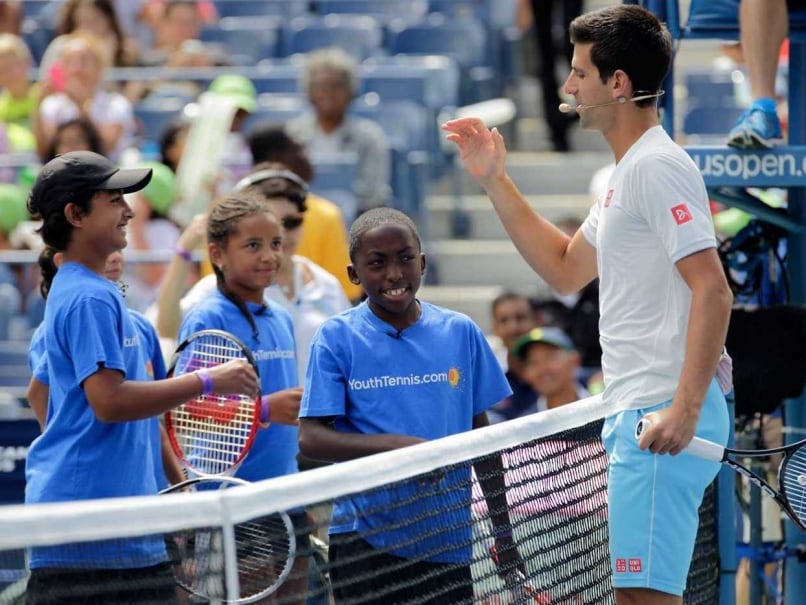Evaluating Priorities Ahead of a Tournament
The sport means the world to tennis superstars but there is a slight shift towards family as well with Novak Djokovic and Roger Federer becoming icons for family men.
- Written by Ben Rothenberg, The New York Times
- Updated: August 24, 2014 04:24 pm IST

Despite his status as the top seed and the hot favorite with oddsmakers to win the U.S. Open, Novak Djokovic arrives in New York considerably undercooked.
After winning Wimbledon and reclaiming the No. 1 ranking in July, Djokovic married his longtime girlfriend, Jelena Ristic, in a seaside ceremony in Montenegro. In addition to the preoccupation and emotion such an occasion typically entails, the two are expecting the birth of their first child. Far from sharp, Djokovic went down in straight-set losses in the second matches of two hardcourt tuneup events in August, to Jo-Wilfried Tsonga in Toronto and to Tommy Robredo in Cincinnati. (Also read: Novak Djokovic says he is a family man now)
Asked Saturday afternoon at the tournament's Media Day about the effect of impending fatherhood on his tennis, Djokovic admitted there had been a shift in his focus. (Related: Murray confident of a strong show in US Open)
"I'm going to enjoy it and try to take as much energy as I can - positive energy," he said of fatherhood, adding that he would try to "transfer that to the tennis court.
"But without a doubt, life changes," he said. "You know, priorities change. My priorities, my family, my wife, my future kid. Tennis is definitely not No. 1 anymore."
Djokovic said he had spoken about such concerns with his coach, Boris Becker, who he said had "been through similar experiences in his life."
"More than one time," he added with a mischievous smile that drew laughs, alluding to Becker's well-publicized romantic entanglements.
Unlike Djokovic, whose preparation and mindset for the event are subject to question, Roger Federer comes to New York already to life as a father of two sets of twins, and with 10 matches under his belt from the warm-up events, having made the final in Toronto and won the title in Cincinnati.
His buoyant mood and confidence mark a return to his own form of normalcy after a disappointing campaign at last year's Open, at the end of a season that qualified as an annus horribilis by his lofty standards. He lost in the fourth round.
"Last year I was trying to convince myself I did have an opportunity," Federer said, "because I feel like once you have had success and once you know how to win majors, or U.S. Opens for that matter, yeah, can you always do it again."
With improved form throughout this season, and especially in the events leading up to this tournament, Federer no longer has to contrive confidence.
"You remember how it feels to win tournaments," he said of his renaissance this year. "You remember, and you get used to that. You almost forget how to lose to a point, and confidence rises. You're back to winning ways again, and everything seems so simple, you know. It's nice feeling that way. I'm looking forward to this tournament, because I really feel like I can play a great tournament. I hope I can show that on the court this year."
Federer is also helped by the absence of the defending champion, Rafael Nadal, who withdrew because of an injury to his right wrist. While Federer said he had sympathy for the tournament and for Nadal's fans, he also recognized the opening created by the absence of his perennial foe.
"The players, I mean, we hope he gets well, and he feels better quickly, and all these things, and he's back on tour soon," Federer said. "But at the same time, I think what stands out is the opportunity, you know, to try to take advantage of him, the fact that he's not here. It's one less really difficult player to beat, maybe."
On the women's side, Serena Williams remains the most difficult player to beat but is looking to salvage a year in which she has maintained her No. 1 ranking but has fallen far short of expectations at major events, losing before the quarterfinals at all three Grand Slam events this year.
Like Federer, Williams has played a great number of matches since Wimbledon, winning titles at Stanford, California, and Cincinnati and reaching the semifinals in Montreal.
"Technically, I should be perfectly fine," she said when asked whether the heavy schedule had worn her out. "I haven't played that much tennis this year."
Though self-deprecating, Williams chafed when it was suggested that her power-soaked era of big shots might be coming to an end with the recent success of opportunistic counterpunchers.
"I don't think my big shots are particularly coming to an end," she said before laughing.
© 2014 New York Times News Service
